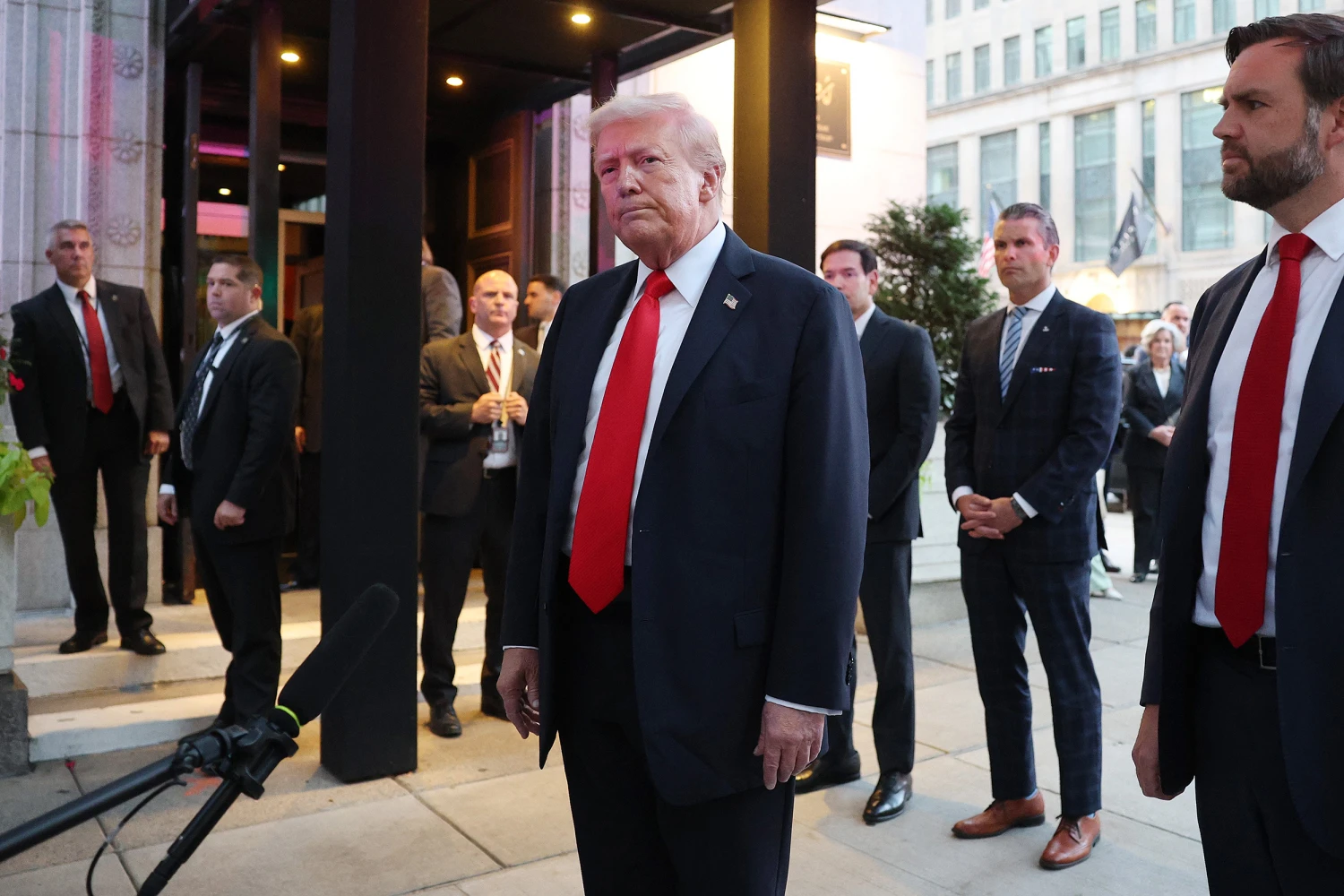Former U.S. President Donald Trump has once again captured global attention after expressing frustration over Israel’s decision to target Hamas leaders reportedly residing in Qatar. His remarks come at a time of heightened tensions in the Middle East, where geopolitical alliances, counterterrorism strategies, and diplomatic negotiations are increasingly entangled. Trump’s statement did not merely highlight his concern about Israel’s military actions; it also reflected the larger complexities of U.S. foreign policy, regional power struggles, and the delicate balance between supporting allies and preventing a wider escalation.
- The Context Behind Israel’s Targeting of Hamas Leaders in Qatar
- Trump’s Frustration and His Larger Foreign Policy Perspective
- Why Qatar Matters in the Regional Balance
- U.S. Domestic Political Implications of Trump’s Reaction
- The Broader Geopolitical Risks
- Expert Reactions and Analysis
- Historical Parallels and Lessons Learned
- Potential Paths Forward
- FAQs
- Why did Israel target Hamas leaders in Qatar?
- Why is Trump frustrated about Israel’s actions in Qatar?
- What role does Qatar play in the Middle East?
- How could this situation affect U.S. politics?
- What are the risks of escalation?
- Conclusion
For decades, Washington has maintained a close relationship with Israel while also working strategically with Qatar, a Gulf state that hosts Hamas’ political leadership yet remains a key partner of the U.S. in terms of military cooperation and energy investments. Trump’s frustration over Israel’s targeting of Hamas leaders in Qatar raises broader questions: Can America continue to manage these competing alliances? What are the risks of escalation in the region? And how do these dynamics shape global security and economic stability? This article takes a deep dive into Trump’s reaction, the context behind Israel’s actions, and the regional and global implications of such a sensitive move.
The Context Behind Israel’s Targeting of Hamas Leaders in Qatar
Israel has long maintained that Hamas poses an existential threat. The militant group, which governs Gaza, has engaged in multiple conflicts with Israel, firing rockets, carrying out attacks, and orchestrating operations beyond Gaza’s borders. While Hamas maintains strong grassroots support in Gaza and across parts of the Arab world, its political leaders often operate outside the enclave, particularly in countries like Qatar and Turkey, which offer them political protection.
Qatar has historically positioned itself as a mediator between Israel and Hamas, hosting talks that occasionally led to ceasefire agreements. At the same time, it has been criticized by Israel and some Western officials for providing a safe haven for Hamas’ political wing. Israel’s reported targeting of Hamas leaders in Qatar, whether through direct operations or intelligence-sharing measures, signals a bold escalation that stretches beyond its usual battlegrounds in Gaza and the West Bank. By extending its reach into Qatar, Israel appears to be sending a message: no Hamas leader is beyond its grasp. However, such actions carry high diplomatic risks, especially considering Qatar’s close ties with the United States and its role as host of a major American military base.
Trump’s Frustration and His Larger Foreign Policy Perspective
Donald Trump’s public frustration is not surprising given his history of vocal and often unconventional foreign policy stances. During his presidency, Trump emphasized America’s commitment to Israel, moving the U.S. embassy to Jerusalem and brokering the Abraham Accords, which normalized relations between Israel and several Arab nations. At the same time, Trump maintained working relations with Qatar, given its strategic importance for U.S. military operations in the Middle East.
By expressing dissatisfaction with Israel’s move, Trump may be signaling concern about undermining U.S. relations with Qatar. If Israel continues to pressure Hamas leaders inside Qatar, it risks pushing Doha away from Washington’s influence and into closer alignment with rival powers such as Iran or even Russia. Trump’s frustration could also stem from his pragmatic outlook on foreign policy—he has often framed U.S. strategy in transactional terms, balancing alliances in ways that serve broader American interests. In this sense, Trump’s remarks highlight the delicate diplomacy required when allies’ actions threaten to destabilize a region already fraught with conflict and competing loyalties.
Why Qatar Matters in the Regional Balance
Qatar plays a unique role in the Middle East’s power dynamics. Despite its small size, the Gulf state wields outsized influence thanks to its massive natural gas reserves, vast financial resources, and strategic diplomatic positioning. Qatar hosts the largest U.S. military base in the region, Al Udeid Air Base, which serves as a critical hub for U.S. operations in Iraq, Syria, and Afghanistan.
At the same time, Qatar has cultivated relationships with Islamist groups, including Hamas and the Taliban, often positioning itself as a broker in negotiations. While this dual role has made Qatar indispensable in certain peace processes, it has also drawn criticism from countries like Saudi Arabia, the United Arab Emirates, and Israel, which view its support for Islamist movements as destabilizing. Israel’s decision to target Hamas leaders in Qatar thus has consequences that stretch far beyond the immediate conflict. It risks undermining U.S.-Qatar relations, threatens to complicate the energy and economic ties between the Gulf and the West, and could even destabilize delicate ceasefire negotiations in Gaza.
U.S. Domestic Political Implications of Trump’s Reaction
Trump’s frustration does not exist in a vacuum; it carries political weight in the U.S. as well. With the 2026 elections drawing closer, Trump’s stance on Israel and Middle East policy continues to shape his image among both supporters and critics. Republican voters, who traditionally value strong support for Israel, may be surprised by his criticism of Israeli actions. Yet Trump’s base has often praised him for his “America First” approach, where he prioritizes U.S. interests even if it means challenging traditional allies. His willingness to call out Israel on this issue could reinforce his image as a leader willing to break with political orthodoxy in defense of what he views as America’s best interests.
Democrats, meanwhile, are likely to seize on Trump’s remarks to highlight inconsistencies in his foreign policy positions. Some within the Democratic Party have also been critical of Israel’s military strategies, particularly regarding civilian casualties in Gaza, and may see Trump’s frustration as an unusual point of alignment. Ultimately, Trump’s reaction underscores how U.S. domestic politics and Middle Eastern diplomacy are deeply interconnected, with ripple effects that extend to electoral strategy and public opinion.
The Broader Geopolitical Risks
Israel’s targeting of Hamas leaders in Qatar is not just a bilateral issue between Israel and Hamas—it carries risks of sparking broader regional instability. Qatar, though small, has powerful allies and the ability to leverage its energy dominance in global markets. If tensions escalate, Qatar could use its natural gas exports as a geopolitical tool, particularly in Europe, where nations remain dependent on imports amid energy security concerns.
Moreover, Israel’s bold actions may encourage retaliation not only from Hamas but also from its allies, including Iran, which maintains close ties with militant groups across the Middle East. An escalation involving Qatar could also strain the fragile coalition built through the Abraham Accords, as Arab nations may see Israel’s actions as overstepping regional boundaries. The U.S., caught in the middle, faces the difficult task of balancing its commitments to Israel while maintaining strategic ties with Qatar. This tightrope act will likely test Washington’s diplomatic agility in the months ahead.
Expert Reactions and Analysis
Experts across the political spectrum have weighed in on the developments. Jonathan Schanzer, a senior analyst on Middle Eastern affairs, has argued that Israel’s move signals a new phase in its counterterrorism strategy, one where no safe havens will be tolerated. “Israel is making it clear that Hamas leaders cannot hide behind friendly governments,” he said in a recent interview. On the other hand, political scientist Shibley Telhami cautioned that such actions could backfire. “Targeting Hamas in Qatar risks destabilizing one of the few countries that has successfully mediated between Israel and its enemies. The U.S. and Israel need Qatar, even if they don’t like its ties to Hamas,” he warned. This divergence in expert opinion highlights the complexity of the issue: while some see Israel’s actions as necessary for long-term security, others fear the immediate diplomatic fallout could outweigh the potential benefits.
Historical Parallels and Lessons Learned
History offers valuable lessons about the risks of extending counterterrorism efforts into allied nations. In the early 2000s, U.S. drone strikes in Pakistan targeting Al Qaeda and Taliban leaders strained relations between Washington and Islamabad. While those operations eliminated high-value targets, they also fueled anti-American sentiment and complicated diplomatic cooperation. Similarly, Israel’s decision to target Hamas leaders in Qatar may weaken its adversaries in the short term but could foster resentment and push Qatar into closer alignment with powers opposed to Israel and the U.S. The lessons of history suggest that counterterrorism strategies that disregard diplomatic fallout often come with long-term consequences.
Potential Paths Forward
Looking ahead, several scenarios are possible. One possibility is de-escalation through diplomacy, where the U.S. urges Israel to halt further operations in Qatar while pressing Doha to reduce Hamas’ activities. Another possibility is escalation and retaliation, in which Hamas or its allies respond with attacks that could ignite wider regional violence. A third scenario involves strategic realignment, with Qatar deepening ties to rival powers if it feels threatened. Finally, quiet compromise may emerge, with Hamas leaders reducing visibility in Qatar in exchange for a pause in Israeli targeting. Each scenario carries risks, and the outcome will depend on the ability of regional powers and the U.S. to navigate this tense moment.
FAQs
Why did Israel target Hamas leaders in Qatar?
Israel views Hamas as a direct threat and has sought to weaken the group by targeting its leadership. By extending operations to Qatar, Israel aims to show that no Hamas leader is beyond its reach, though this comes with significant diplomatic risks.
Why is Trump frustrated about Israel’s actions in Qatar?
Trump’s frustration likely stems from concerns that Israel’s actions could destabilize U.S. relations with Qatar, a key American ally that hosts a major military base and plays an important role in regional diplomacy.
What role does Qatar play in the Middle East?
Qatar is both a U.S. ally and a host for Hamas’ political leadership. It has positioned itself as a mediator in regional conflicts while maintaining close ties to Islamist groups. Its energy resources and U.S. military partnership make it strategically vital.
How could this situation affect U.S. politics?
Trump’s remarks could influence voter perceptions ahead of the 2026 elections. While some may see his criticism of Israel as surprising, it aligns with his “America First” strategy of prioritizing U.S. interests above traditional alliances.
What are the risks of escalation?
If tensions escalate, the situation could strain U.S.-Qatar relations, disrupt energy markets, and spark wider conflict involving Hamas, Iran, and potentially other regional powers.
Conclusion
Trump’s frustration over Israel targeting Hamas leaders in Qatar sheds light on the fragile and often contradictory web of alliances in the Middle East. Israel, determined to weaken Hamas, risks undermining its own diplomatic standing by striking at leaders sheltered in Qatar, a country that is simultaneously a U.S. ally and a Hamas host. For Trump, the issue underscores the delicate balance America must strike between supporting Israel and safeguarding its broader strategic interests in the region. The episode reveals a larger truth: Middle Eastern diplomacy is rarely about simple alliances. It is about navigating contradictions, managing competing priorities, and making choices where every action has unintended consequences. Whether this moment leads to escalation or renewed diplomacy will depend not only on Israel and Hamas but also on the United States’ ability to mediate effectively. Trump’s frustration is, in many ways, a warning—an acknowledgment that even close allies must tread carefully when their actions risk unraveling a fragile balance of power.








